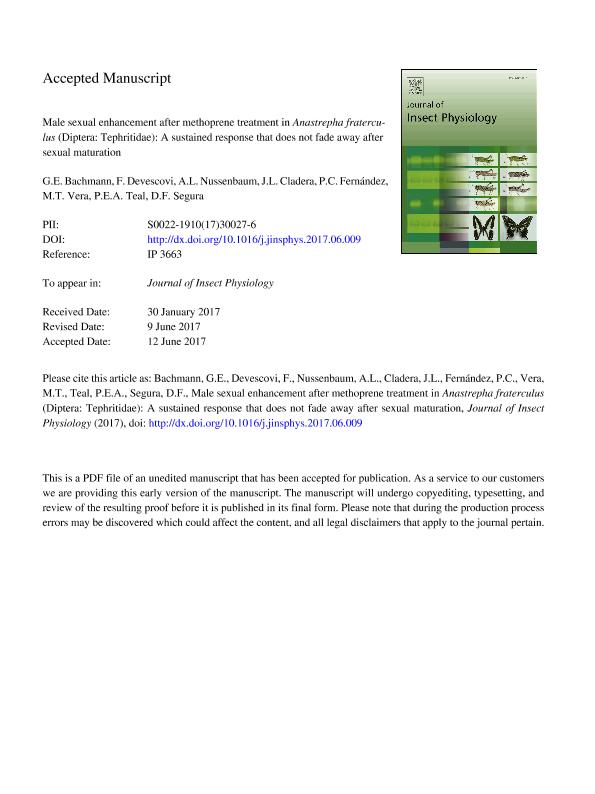Artículo
Male sexual enhancement after methoprene treatment in Anastrepha fraterculus (Diptera: Tephritidae): A sustained response that does not fade away after sexual maturation
Bachmann, Guillermo Enrique ; Devescovi, Francisco
; Devescovi, Francisco ; Nussenbaum, Ana Laura
; Nussenbaum, Ana Laura ; Cladera, Jorge Luis; Fernandez, Patricia Carina
; Cladera, Jorge Luis; Fernandez, Patricia Carina ; Vera, María Teresa
; Vera, María Teresa ; Teal, P. E. A.; Segura, Diego Fernando
; Teal, P. E. A.; Segura, Diego Fernando
 ; Devescovi, Francisco
; Devescovi, Francisco ; Nussenbaum, Ana Laura
; Nussenbaum, Ana Laura ; Cladera, Jorge Luis; Fernandez, Patricia Carina
; Cladera, Jorge Luis; Fernandez, Patricia Carina ; Vera, María Teresa
; Vera, María Teresa ; Teal, P. E. A.; Segura, Diego Fernando
; Teal, P. E. A.; Segura, Diego Fernando
Fecha de publicación:
08/2017
Editorial:
Pergamon-Elsevier Science Ltd
Revista:
Journal of Insect Physiology
ISSN:
0022-1910
Idioma:
Inglés
Tipo de recurso:
Artículo publicado
Clasificación temática:
Resumen
The juvenile hormone (JH) of insects triggers physiological changes related to reproduction in adults of both sexes. Methoprene is a sesquiterpene with some effects that are analogous to those of JH. Treatments with methoprene accelerate sexual maturation in males of the South American fruit fly Anastrepha fraterculus, giving young males a mating advantage over non-treated males of the same age. Here, we evaluated the effects of methoprene treatment on A. fraterculus males after the sexual maturation phase and tested whether this compound provides a long-term mating advantage. Moreover, we took the first step to unravel the mechanisms that underlie male sexual enhancement. We treated males 1 day or 8 days after adult emergence and compared mate choice between recently matured (young) females and females that had been mature for ca. 10 days (aged females). We also addressed methoprene treatment effects on male sexual signalling. We found that methoprene treatment enhanced male sexual competitiveness even after the sexual maturation phase, and the effect did not decrease until males were older than 20 days. However, when methoprene treatment was carried out close to sexual maturity, the mating enhancement was no longer observed, suggesting a non-immediate effect and excluding the possibility that methoprene acts as a pheromonal compound. Young and aged females tended to mate more frequently with treated-males. This might indicate that in a context of sexual selection, the potential benefits associated with reproductive success would be similar for females of both ages. Treated males released larger amounts of pheromonal compounds than non-treated males, but their courtship behaviour was not altered to the same extent, suggesting that methoprene treatment may accelerate differently the components of male courtship. We discuss potential benefits of using methoprene to increase the efficiency of the sterile insect technique, which is an environmentally safe method to control this important South American fruit pest.
Archivos asociados
Licencia
Identificadores
Colecciones
Articulos(CCT - NOA SUR)
Articulos de CTRO.CIENTIFICO TECNOL.CONICET - NOA SUR
Articulos de CTRO.CIENTIFICO TECNOL.CONICET - NOA SUR
Articulos(SEDE CENTRAL)
Articulos de SEDE CENTRAL
Articulos de SEDE CENTRAL
Citación
Bachmann, Guillermo Enrique; Devescovi, Francisco; Nussenbaum, Ana Laura; Cladera, Jorge Luis; Fernandez, Patricia Carina; et al.; Male sexual enhancement after methoprene treatment in Anastrepha fraterculus (Diptera: Tephritidae): A sustained response that does not fade away after sexual maturation; Pergamon-Elsevier Science Ltd; Journal of Insect Physiology; 101; 8-2017; 7-14
Compartir
Altmétricas



